BusinessEurope Headlines No. 2018-32
Companies treasure Europe’s key foundations and values
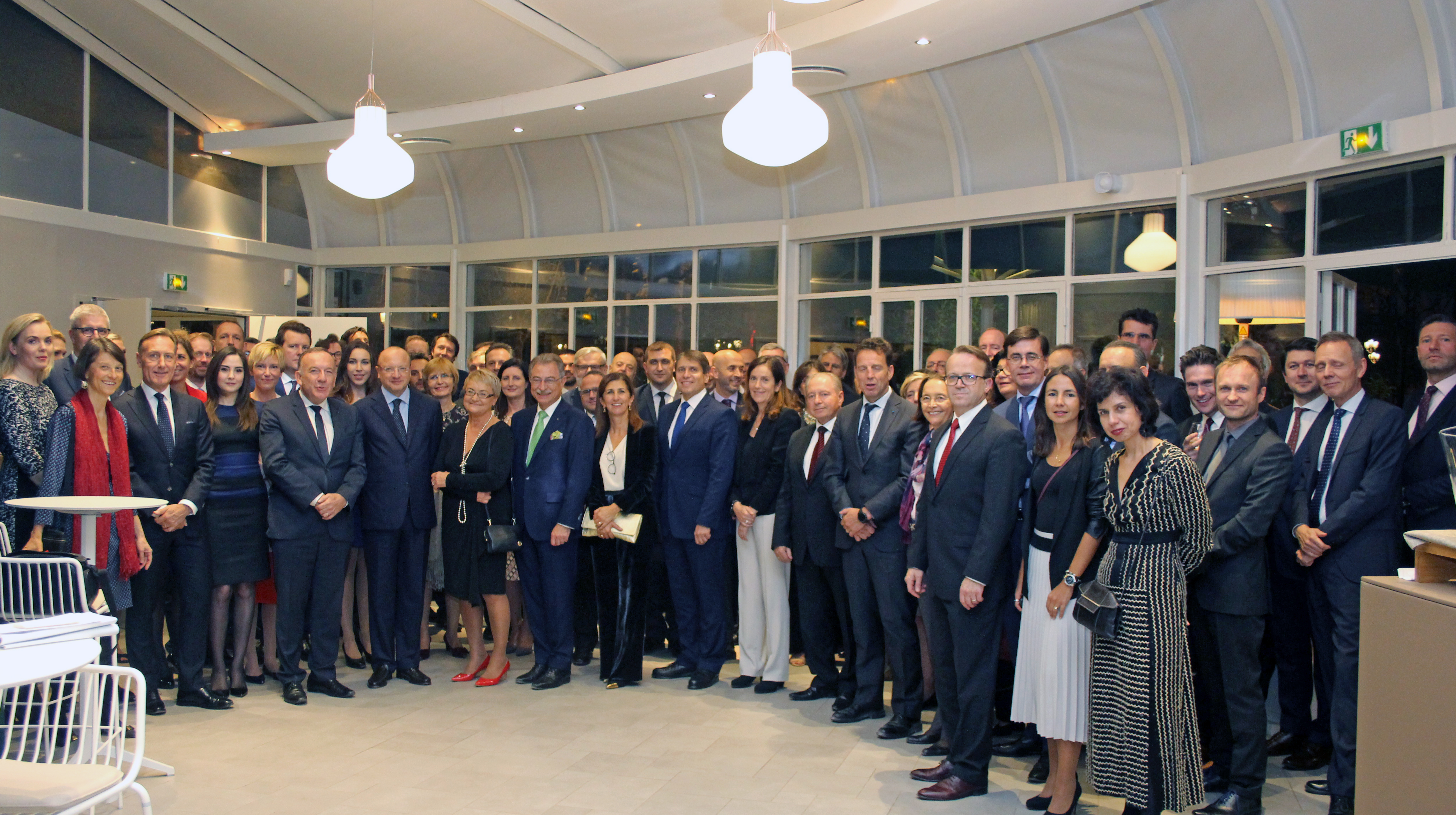
On the initiative of its new President, Pierre Gattaz, BusinessEurope has gathered its members for a seminar in Paris on 9 and 10 October to define their expectations on the evolution of the further construction of Europe, its key foundations and values, in view of the European elections in 2019. This seminar has united 85 top representatives of its 39 member federations. A wide and open survey was conducted beforehand to determine the strengths, weaknesses and opportunities of Europe and the risks it is facing.
The answers show that European companies:
- consider that the EU Single Market is the crown jewel of the European Union. Respondents unanimously found the Single Market to be very important (83%) or important (17%) for business success.
- support the euro without any doubt for the countries that are being part of it. Thus, 100% of the euro area members feel very positive (61%) or positive (39%) about the benefits of belonging to the single currency.
- regard the EU common trade policy as highly beneficial, with 59% of its members considering it is very important and 28% important.
- are deeply concerned about the nationalist tendencies that could undermine the European project and its four fundamental freedoms (freedom of movement of goods, services, capital, people), which are the basis of our prosperity.
They want business competitiveness, simplification and skills to be at the heart of the European strategy, and will express more specific expectations for the future in the coming weeks.
BusinessEurope President Pierre Gattaz commented: "This seminar is a first step to build a common vision of what European companies are expecting. While some people want to question the construction of Europe as we have known it for 60 years, companies have reiterated their commitment to further develop the Single Market and strengthen the Economic and Monetary Union. Europe is not an option but a necessity. It must evolve towards more efficiency and simplification but the direction is the right one. Do not give in to simplistic solutions."
Contact: Daniele Olivieri
Our comment
Businesses want to improve connectivity between Asia and Europe
By Maurice Fermont, Adviser for International Relations
 Asia and Europe are growing ever more interconnected. The 51 countries that make up the Asia-Europe Meeting (ASEM) represent 60% of the global population, 65% of the global economy, and 55% of global trade. This year ASEM will take place in Brussels on 17-18 October and will address a number of political, economic, social, cultural and educational issues of common interest. BusinessEurope will organise a side event, the Asia-Europe Business Forum on 18 October and bring together businesses in order to discuss and develop a roadmap for improved Eurasian connectivity.
Asia and Europe are growing ever more interconnected. The 51 countries that make up the Asia-Europe Meeting (ASEM) represent 60% of the global population, 65% of the global economy, and 55% of global trade. This year ASEM will take place in Brussels on 17-18 October and will address a number of political, economic, social, cultural and educational issues of common interest. BusinessEurope will organise a side event, the Asia-Europe Business Forum on 18 October and bring together businesses in order to discuss and develop a roadmap for improved Eurasian connectivity.
The Asia-Europe Business Forum (AEBF) will bring together business leaders, government representatives, journalists and think tank experts from Asia and Europe who share the goal of strengthening trade and investment relations between the two continents. As an official side event of the Asia-Europe meeting (ASEM), the AEBF is a great platform for businesses to engage with each other and with political leaders from both regions and communicate concrete ideas on how to tackle today’s and tomorrow’s challenges and boost economic growth, development and job creation across the two continents.
This AEBF focuses on enhancing connectivity – the improvement of all forms of networks such as transport links by air, land, or sea; digitally through mobile and internet; and energy networks through improving electricity grids, rolling out renewables and improving energy efficiency. Europe is now taking major steps in order to improve Eurasian connectivity. First, the EU is in the process of ratifying three important free trade agreements: with Japan, Singapore, and Vietnam. These agreements are important steps to open new markets and secure rules-based trade at a time when the multilateral trading system is under pressure. Second, the EU launched its Connectivity Strategy in September in order to enhance sustainable, comprehensive and rules-based connectivity.
At a time when multiple countries have put forward their views and strategies on connectivity, what matters for the business community is that both the “framework conditions” for connectivity – the rules that enable fair and sustainable connectivity projects – as well as the financing mechanisms for individual projects meet international criteria, are open, transparent and enable fair competition so that companies can compete fairly and equitably and that the end result is economically and environmentally sustainable.
We are now at the beginning of a new push for improved connectivity. The Asian Development Bank estimates that Asia’s infrastructure demand will exceed US $1.7 trillion per year, and we are not yet anywhere near meeting this demand.[1] The EU’s own fund for strategic investments launched in 2015 has thus far triggered 344 billion euros in additional investment that have benefited around 787 000 SMEs.[2] The EU, and more importantly, European companies, clearly show that they have the knowledge, capacity, and willingness to meet the growing demand for worldwide connectivity.
Contact: Maurice Fermont
CETA has opened up new opportunities for small businesses in Europe and Canada
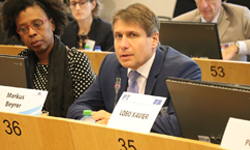 “CETA is not just another free trade agreement. It is actually an agreement that achieved a number of deliverables that seemed almost impossible when we started negotiating. Now, the most important challenge on the path towards full implementation is to raise awareness and ensure all firms are aware of the new opportunities this agreement has opened up for them,” said Markus J. Beyrer, BusinessEurope Director General, at the business round table “Opportunities arising from CETA for SMEs”, jointly organised by the Employers’ Group of the European Economic and Social Committee (EESC) and the Mission of Canada on 4 October. Beyrer highlighted the already evident benefits after one year since CETA entered into force, particularly the rise of exports by over 7% from September 2017 till September 2018, and success in sectors like agri-food and textiles. He encouraged businesses to speak up on how CETA is delivering to gain support to the agreement in those countries that have not ratified it yet. “A trade agreement needs to deliver on promises and expectations. It is up to all of us to make sure that it does,” he added.
“CETA is not just another free trade agreement. It is actually an agreement that achieved a number of deliverables that seemed almost impossible when we started negotiating. Now, the most important challenge on the path towards full implementation is to raise awareness and ensure all firms are aware of the new opportunities this agreement has opened up for them,” said Markus J. Beyrer, BusinessEurope Director General, at the business round table “Opportunities arising from CETA for SMEs”, jointly organised by the Employers’ Group of the European Economic and Social Committee (EESC) and the Mission of Canada on 4 October. Beyrer highlighted the already evident benefits after one year since CETA entered into force, particularly the rise of exports by over 7% from September 2017 till September 2018, and success in sectors like agri-food and textiles. He encouraged businesses to speak up on how CETA is delivering to gain support to the agreement in those countries that have not ratified it yet. “A trade agreement needs to deliver on promises and expectations. It is up to all of us to make sure that it does,” he added.
Contact: Eleonora Catella
Presenting Better Regulation priorities in the Council
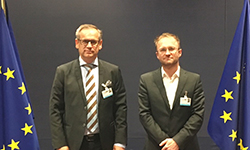 On 5 October, Jens Hedström, Chair of BusinessEurope’s Better Regulation Working Group, and Martynas Barysas, BusinessEurope Director of the Internal Market Department, presented the industry’s priorities for the Better Regulation agenda during a meeting of the Council Working Party on Better Regulation. BusinessEurope presented its six strategy papers on Better Regulation which have recently been published in light of the European Commission’s stocktaking exercise. Hedström highlighted the importance of regulatory simplification, and in particular the work of the REFIT Platform which needs to be continued under the next Commission. He noted that BusinessEurope will prepare a list of concrete simplification proposals, which will be submitted to the Commission to be implemented as soon as possible. Barysas covered the role of Impact Assessments in the legislative process and, among other matters, called for more diligent assessments and for the Council to play a more active role in case of ‘significant amendments’. Regarding the transposition of EU directives, Barysas underlined the need for more transparency to avoid the fragmentation of the EU Single Market. In this light the Commission is invited to take the lead in defining a set of guiding principles. The presentation was well-received by many members of the Working Party and stimulated a constructive exchange of views.
On 5 October, Jens Hedström, Chair of BusinessEurope’s Better Regulation Working Group, and Martynas Barysas, BusinessEurope Director of the Internal Market Department, presented the industry’s priorities for the Better Regulation agenda during a meeting of the Council Working Party on Better Regulation. BusinessEurope presented its six strategy papers on Better Regulation which have recently been published in light of the European Commission’s stocktaking exercise. Hedström highlighted the importance of regulatory simplification, and in particular the work of the REFIT Platform which needs to be continued under the next Commission. He noted that BusinessEurope will prepare a list of concrete simplification proposals, which will be submitted to the Commission to be implemented as soon as possible. Barysas covered the role of Impact Assessments in the legislative process and, among other matters, called for more diligent assessments and for the Council to play a more active role in case of ‘significant amendments’. Regarding the transposition of EU directives, Barysas underlined the need for more transparency to avoid the fragmentation of the EU Single Market. In this light the Commission is invited to take the lead in defining a set of guiding principles. The presentation was well-received by many members of the Working Party and stimulated a constructive exchange of views.
Contact: Jonathan Gray
CEOE and BusinessEurope event on circular economy
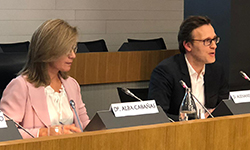 “Industry’s role in the transition to circular economy is pivotal. A number of good practices emerge across many sectors in Europe such as packaging, ICT, power, chemicals or food and drinks,” said Alexandre Affre, BusinessEurope Industrial Affairs Director, at an event co-organised by the Confederation of Employers and Industries of Spain (CEOE) and BusinessEurope in Madrid on 5 October. Affre presented the Circular Economy Industry Platform (www.circulary.eu) that showcases companies’ good practices in becoming circular and challenges they face. After more than one year, the platform now gathers 140 companies’ concrete cases. Interested? Please submit your cases here.
“Industry’s role in the transition to circular economy is pivotal. A number of good practices emerge across many sectors in Europe such as packaging, ICT, power, chemicals or food and drinks,” said Alexandre Affre, BusinessEurope Industrial Affairs Director, at an event co-organised by the Confederation of Employers and Industries of Spain (CEOE) and BusinessEurope in Madrid on 5 October. Affre presented the Circular Economy Industry Platform (www.circulary.eu) that showcases companies’ good practices in becoming circular and challenges they face. After more than one year, the platform now gathers 140 companies’ concrete cases. Interested? Please submit your cases here.
Contact: Alexandre Affre
Promoting and reinforcing social dialogue in Balkan countries
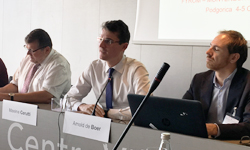 “Progress is needed to improve social partnership in Balkan candidate countries before they join the EU. This includes the need for strong and independent social partner organisations. It is up to national social partners in these countries to see, with their governments, how to improve the functioning of tripartite social dialogue bodies and of collective bargaining at the appropriate levels to foster the competitiveness of enterprises and social progress. It is also important for social partners in these countries to understand the functioning of the European social dialogue before their countries join the EU”. These were the main messages given by BusinessEurope Social Affairs Director Maxime Cerutti at the seminar on “Promoting and reinforcing social dialogue in candidate countries”, organised by the European social partners in Podgorica, Montenegro on 4-5 October. This seminar brought together social partners representatives from Montenegro, Serbia, FYROM and Albania.
“Progress is needed to improve social partnership in Balkan candidate countries before they join the EU. This includes the need for strong and independent social partner organisations. It is up to national social partners in these countries to see, with their governments, how to improve the functioning of tripartite social dialogue bodies and of collective bargaining at the appropriate levels to foster the competitiveness of enterprises and social progress. It is also important for social partners in these countries to understand the functioning of the European social dialogue before their countries join the EU”. These were the main messages given by BusinessEurope Social Affairs Director Maxime Cerutti at the seminar on “Promoting and reinforcing social dialogue in candidate countries”, organised by the European social partners in Podgorica, Montenegro on 4-5 October. This seminar brought together social partners representatives from Montenegro, Serbia, FYROM and Albania.
Contact: Jessie Fernandes
European business calls for ratification of the EU-Vietnam Free Trade Agreement
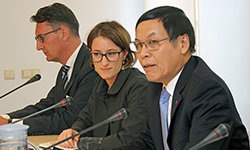 “The EU-Vietnam Free Trade Agreement is comprehensive and ambitious, eliminating over 99% of tariffs. Business is particularly pleased with the ambitious tariff liberalisation scheme, the strong public procurement provisions and extensive disciplines concerning State-Owned Enterprises that contribute to levelling the playing field between companies,” said Eleonora Catella, BusinessEurope Senior Trade Adviser, during the public hearing “EU-Vietnam Free Trade and Investment Protection Agreements: Benefits and Values” that took place at the European Parliament on 10 October. Catella emphasised the benefits of the EU-Vietnam Free Trade Agreement, from provisions to guarantee transparency on trade rules, high level of protection for intellectual property rights to improved access to markets and investment in various sectors. Catella identified these opportunities for both economies also at an event on 8 October, “The EU-Vietnam Free Trade Agreement: Perspectives from Vietnam”, organised by BusinessEurope in cooperation with amfori and the European Chamber of Commerce in Vietnam. “The EU-Vietnam Free Trade Agreement will clearly contribute to the sustainable growth of both Vietnam and the EU, and the European businesses hope it will be ratified soon,” Catella concluded.
“The EU-Vietnam Free Trade Agreement is comprehensive and ambitious, eliminating over 99% of tariffs. Business is particularly pleased with the ambitious tariff liberalisation scheme, the strong public procurement provisions and extensive disciplines concerning State-Owned Enterprises that contribute to levelling the playing field between companies,” said Eleonora Catella, BusinessEurope Senior Trade Adviser, during the public hearing “EU-Vietnam Free Trade and Investment Protection Agreements: Benefits and Values” that took place at the European Parliament on 10 October. Catella emphasised the benefits of the EU-Vietnam Free Trade Agreement, from provisions to guarantee transparency on trade rules, high level of protection for intellectual property rights to improved access to markets and investment in various sectors. Catella identified these opportunities for both economies also at an event on 8 October, “The EU-Vietnam Free Trade Agreement: Perspectives from Vietnam”, organised by BusinessEurope in cooperation with amfori and the European Chamber of Commerce in Vietnam. “The EU-Vietnam Free Trade Agreement will clearly contribute to the sustainable growth of both Vietnam and the EU, and the European businesses hope it will be ratified soon,” Catella concluded.
Contact: Eleonora Catella
Companies need customs simplifications in order to balance compliance commitments and benefits
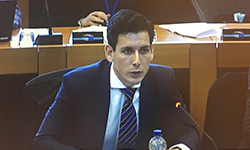 “The introduction of the Union Customs Code (UCC) in 2016 has been a good step to promote better customs legislation that is fit for purpose. Today, however, many of the benefits for companies outlined in the UCC have not yet been implemented, and companies fear that the balance between complying with greater risk control and simplifications that facilitate trade might be lost,” said Maurice Fermont, BusinessEurope International Trade Adviser, on 9 October at a workshop on strengthening the competitiveness of the internal market organised by the Internal Market and Consumer Protection Committee of the European Parliament. Strengthening the competitiveness of the EU Internal Market through developing the customs relies partly on predictable, consistent policies that are applied uniformly across the EU, and partly on the reduction of friction for companies – the process of simplifying procedures, reducing administrative commitments, and enabling companies to trade quickly and efficiently within the Internal Market and beyond. Business requires at least four elements to share in the benefits of the UCC: self-assessment for classifying goods, centralised customs clearance for import, a “one stop shop” for all paper work, controls, requests and questions, and additional simplifications for Authorised Economic Operators. “We regret the delay in implementing the IT systems to deliver some of these simplifications from 2020 to 2025. But business wants a smooth operating system and encourages the European Commission to look at possible pilot-projects to speed up IT development, regular stocktaking to avoid missing the next deadline, and evaluate whether more resources should be devoted at EU and Member State level to implement the tools required,” Fermont concluded.
“The introduction of the Union Customs Code (UCC) in 2016 has been a good step to promote better customs legislation that is fit for purpose. Today, however, many of the benefits for companies outlined in the UCC have not yet been implemented, and companies fear that the balance between complying with greater risk control and simplifications that facilitate trade might be lost,” said Maurice Fermont, BusinessEurope International Trade Adviser, on 9 October at a workshop on strengthening the competitiveness of the internal market organised by the Internal Market and Consumer Protection Committee of the European Parliament. Strengthening the competitiveness of the EU Internal Market through developing the customs relies partly on predictable, consistent policies that are applied uniformly across the EU, and partly on the reduction of friction for companies – the process of simplifying procedures, reducing administrative commitments, and enabling companies to trade quickly and efficiently within the Internal Market and beyond. Business requires at least four elements to share in the benefits of the UCC: self-assessment for classifying goods, centralised customs clearance for import, a “one stop shop” for all paper work, controls, requests and questions, and additional simplifications for Authorised Economic Operators. “We regret the delay in implementing the IT systems to deliver some of these simplifications from 2020 to 2025. But business wants a smooth operating system and encourages the European Commission to look at possible pilot-projects to speed up IT development, regular stocktaking to avoid missing the next deadline, and evaluate whether more resources should be devoted at EU and Member State level to implement the tools required,” Fermont concluded.
Contact: Maurice Fermont
Discussing sustainable finance with Belgian Federal Council for Sustainable Development
 “European business supports the objective of the ‘sustainable finance action plan’ to further mobilise investments for sustainable growth,” said BusinessEurope Industrial Policy Adviser Asdin El Habbassi at a Seminar on Green Finance organised by the Belgian Federal Council for Sustainable Development on 5 October in Brussels. The event brought together experts and policymakers on sustainable finance to discuss how to define "green" for financing the transition to a low carbon economy. “Europe’s 2030 climate goals and Paris Agreement commitments will require huge, transformative investments by both public and private sectors. Annual investments of around €180 billion will be needed to achieve the EU's climate and energy goals. If well designed, the proposals have the potentials to help closing this investment gap,” he added.Contact: Asdin El Habbassi
“European business supports the objective of the ‘sustainable finance action plan’ to further mobilise investments for sustainable growth,” said BusinessEurope Industrial Policy Adviser Asdin El Habbassi at a Seminar on Green Finance organised by the Belgian Federal Council for Sustainable Development on 5 October in Brussels. The event brought together experts and policymakers on sustainable finance to discuss how to define "green" for financing the transition to a low carbon economy. “Europe’s 2030 climate goals and Paris Agreement commitments will require huge, transformative investments by both public and private sectors. Annual investments of around €180 billion will be needed to achieve the EU's climate and energy goals. If well designed, the proposals have the potentials to help closing this investment gap,” he added.Contact: Asdin El Habbassi
Major Economies Business Forum workshop at OECD on Paris Agreement
 “The Paris Agreement is a major opportunity for stronger global climate actions. The challenges related to its implementation, however, need to be overcome as soon as possible,” said BusinessEurope Environment and Climate Adviser Leon de Graaf at the Major Economies Business Forum (BizMEF) and the Business at OECD (BIAC) workshop on business solutions for the Paris climate Agreement on 10 October in Paris. “The slow progress related to agreeing on the Paris Agreement’s rules and procedures, also known as the Paris Rulebook has to be solved soon. As well as the fact that no other major economy has so far converged its climate ambitions with that of Europe. Only then will we be able to have a chance to limit global warming to 1.5 degrees Celsius, as was stressed earlier this week in a special report by the Intergovernmental Panel on Climate Change (IPCC),” he added.
“The Paris Agreement is a major opportunity for stronger global climate actions. The challenges related to its implementation, however, need to be overcome as soon as possible,” said BusinessEurope Environment and Climate Adviser Leon de Graaf at the Major Economies Business Forum (BizMEF) and the Business at OECD (BIAC) workshop on business solutions for the Paris climate Agreement on 10 October in Paris. “The slow progress related to agreeing on the Paris Agreement’s rules and procedures, also known as the Paris Rulebook has to be solved soon. As well as the fact that no other major economy has so far converged its climate ambitions with that of Europe. Only then will we be able to have a chance to limit global warming to 1.5 degrees Celsius, as was stressed earlier this week in a special report by the Intergovernmental Panel on Climate Change (IPCC),” he added.
Contact: Leon de Graaf
Collective redress for consumers should not be a back door to abusive litigation
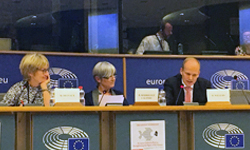 The EU should not adopt a collective redress system that can lead to abusive litigation culture in Europe. This was one of the key messages of Heiko Willems, Chairman of BusinessEurope’s Legal Affairs Committee, during his intervention at the workshop “European Collective Redress - Strengthening the Rights of EU Citizens“, organised by the Progressive Alliance of Socialists and Democrats in the European Parliament on 8 October. “It’s all about safeguards,” Heiko added, urging the Parliament to consider all the safeguards from the European Commission’s own 2013 Recommendation on Collective Redress in the proposal part of the New Deal for Consumers package. These messages were also reiterated by Marie Pedersen, Legal Adviser at BusinessEurope, on the occasion of the European Law Academy annual consumer law conference on 11 October in Trier, Germany. Read Business Europe’s position paper on the proposal for collective redress for consumers here.
The EU should not adopt a collective redress system that can lead to abusive litigation culture in Europe. This was one of the key messages of Heiko Willems, Chairman of BusinessEurope’s Legal Affairs Committee, during his intervention at the workshop “European Collective Redress - Strengthening the Rights of EU Citizens“, organised by the Progressive Alliance of Socialists and Democrats in the European Parliament on 8 October. “It’s all about safeguards,” Heiko added, urging the Parliament to consider all the safeguards from the European Commission’s own 2013 Recommendation on Collective Redress in the proposal part of the New Deal for Consumers package. These messages were also reiterated by Marie Pedersen, Legal Adviser at BusinessEurope, on the occasion of the European Law Academy annual consumer law conference on 11 October in Trier, Germany. Read Business Europe’s position paper on the proposal for collective redress for consumers here.
![]() Contact: Marie Pedersen
Contact: Marie Pedersen
Calendar
- 16 October: Tripartite Social Summit
- 18 October: Asia-Europe Business Forum (AEBF)
- 18-19 October: 12th Asia-Europe Meeting (ASEM) summit
- 18-19 October: European Council
Reminder: please take a look at our revised privacy policy
